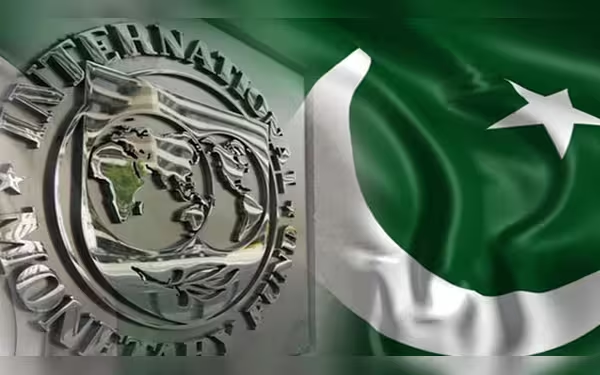Saturday, November 16, 2024 05:46 PM
IMF Urges Pakistan to Combat Corruption and Political Harassment
- IMF demands action against corruption by June 2025.
- NAB must be independent for effective investigations.
- Pakistan's GDP projected at 4-4.5% through 2029.
 Image Credits: thefrontierpost
Image Credits: thefrontierpostIMF demands Pakistan address corruption and political harassment, urging reforms for economic stability and growth.
In a significant move, the International Monetary Fund (IMF) has issued a stern warning to Pakistan regarding the urgent need to address corruption and political harassment in corruption cases. This comes in the wake of the IMF Executive Board's approval on September 25 of a 37-month Extended Fund Facility (EFF) arrangement, which amounts to approximately US$7 billion. The primary objective of this arrangement is to bolster Pakistan's economic stability and growth, focusing on sustainable public finances, reduced inflation, and enhanced external buffers.
The IMF has highlighted the necessity for an effective investigation system to tackle corruption. It has suggested that the National Accountability Bureau (NAB) should be made more independent and effective, aligning with the directives of the top court. Furthermore, the IMF has called for a comprehensive action plan aimed at eradicating corruption by June 2025. This is a crucial step, as the organization believes that corruption is severely undermining Pakistan's reform efforts.
Moreover, the IMF has stressed the importance of digitizing the Federal Board of Revenue (FBR). This digitization would facilitate public declarations of assets by all government officials, including parliamentarians, thereby promoting transparency. The IMF stated, "The government must ensure that NAB is provided with accurate data to investigate corruption cases effectively." This statement underscores the need for the government to support NAB in its fight against corruption.
In addition to addressing corruption, the IMF has unveiled new loan conditions for Pakistan. The report emphasizes the necessity for the Pakistani government to stabilize the macroeconomic situation in accordance with the loan agreement. The government has been urged to implement economic reforms and create favorable conditions for the private sector to stimulate economic growth. Furthermore, the IMF has called for an expansion of the tax net, a reduction in government spending, and expedited reforms in state-owned enterprises.
Looking ahead, the IMF has projected that Pakistan's GDP will remain between 4 to 4.5 percent during the fiscal years 2024-25 to 2029-30, while inflation is expected to range between 6.6 to 9 percent. The emphasis on the implementation of economic reform policies is critical for the country's financial health.
On September 27, Pakistan received the first tranche of the IMF's funding, following the approval of the Extended Fund Facility. The State Bank of Pakistan (SBP) received SDR 760 million, equivalent to USD 1,026.9 million, marking a significant step in the financial support process.
The IMF's demands for action against corruption and political harassment are not just about meeting loan conditions; they are essential for Pakistan's long-term economic stability and growth. By addressing these issues head-on, Pakistan can pave the way for a more transparent and accountable governance structure, ultimately benefiting its citizens and fostering a healthier economic environment.













